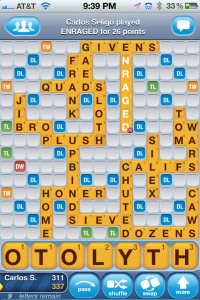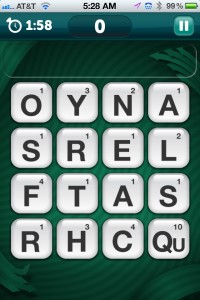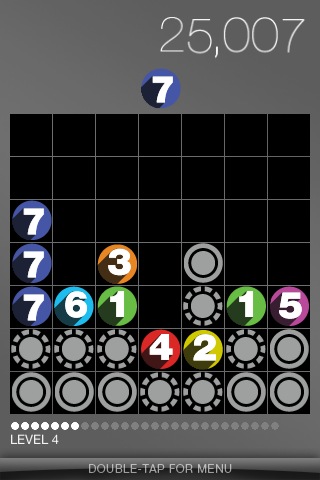I like to play word games. Scrabble and Boggle are two of my childhood favorites, and nowadays I play Zynga’s “With Friends” versions of both games on my phone. (If you want to play me, look for “cassidyjcurtis” or “otherthings”!)
Both games are about scrambling letters up into words, and both make heavy use of the anagram-loving part of me. But I’ve noticed that the two games produce very different mental states. The reason has to do with how they make use of time.

In Scrabble, there’s no time limit. You’re free to take as long as you want to play a word, but you can’t take it back once you’ve played it. The effect that has, on me anyway, is to make me an optimizer. I try to find the best possible word for the given moment, taking everything into account: the score, the state of the board, the consonant-to-vowel balance of my rack, how many letters are left, and so on. It’s a complex mix of concerns, and sometimes I just can’t see any option that’s clearly the best. But because I know my vocabulary is limited, I always suspect that a better word is out there that I’m just not seeing. When this happens, I get stuck, unable to play, effectively paralyzed. So Scrabble as a game makes me happy when I’m doing well, and miserable when I’m not. It’s not so much about the score of the game, as whether I’m measuring up to some abstract ideal of the perfect player. What a headache!

In Boggle, there’s a hard time limit, and the goal is to find as many words as you can in that time. Some words are worth more than others, of course, but it’s usually better to find lots of small words than a handful of huge ones. So when the clock starts ticking, I just start finding words as fast as I can, with no time wasted on judging good from better. And what I find tends to happen is that small words lead to bigger words, in a stream-of-consciousness kind of way that’s energetic but not stressful, and just a lot of fun. I only pop up to look at the big picture when the vein I’m mining runs dry. And before I know it, time is up, and I’ve finished my turn exhilarated by the effort. Sometimes I win, and sometimes I lose, but I always enjoy the game. And enjoying the game, feeling that state of flow and fun, directly impacts my ability to play it well.
What this has to do with animation, or any complex creative work, should be pretty clear. You can approach a new shot in either way: give yourself all the time in the world to find the best possible idea, or give yourself a hard time limit (to accomplish some part of the job) and just start exploring, and then see what you’ve got when your time runs out.
I’ve experimented with the size of the task and the length of the time limit. And what I’ve noticed surprised me: the shorter the time limit, the more fun I have. And more fun leads to better quality work. I do still feel the urge to optimize sometimes. But on my best days, I’m too busy playing to notice.

